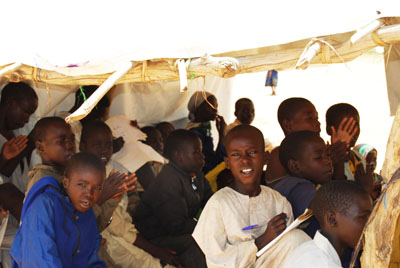
Fighting in Darfur has gone on for over seven years now, forcing nearly three million people from their homes. Rarely do we hear more than anecdotal remarks from the displaced people themselves, often quoted by journalists who haven’t even been permitted to set foot inside Darfur, about what should be done to end the conflict.
The release this past week of the first-ever survey of Darfuri refugees on the topics of peace and justice thankfully changed this situation somewhat. The survey, which provides valuable insights into the Darfuri refugee community living over the border in eastern Chad, reveals remarkably high rates of consensus on such controversial topics as the Darfur peace process, the ICC arrest warrant for President Bashir, and what it will take for peace to come to the region (read: so many things that many think it may not be possible) – all of which should be taken into account by mediators and policy makers as they move forward with peace efforts for Darfur.
From April to July 2009, the New York-based organization 24 Hours for Darfur conducted interviews with 2,152 refugees, including some rebels, living in the 12 camps in eastern Chad. Their findings help explain what many refugees feel are the “necessary conditions for a just peace in Darfur.” It’s important to keep in mind that the responses illustrate the views of refugees, not the 2.7 million internally displaced people still living in Darfur. This latter, larger group may have divergent views on immediate needs, threats, and the means to address both. More than anything, this limitation should be viewed as further evidence of the very tenuous nature of the conflict – surveyors viewed it as unfeasible from an access and security standpoint to collect responses from the affected communities inside Sudan’s borders.
The report was particularly timely as news broke that the International Criminal Court would issue a second arrest warrant for Sudanese President Omar al-Bashir – this time for genocide in Darfur. The news churned up the ongoing debate about whether calling for the apprehension of the Sudanese president will help or hinder peace efforts in the region. Darfuri refugees interviewed in the survey overwhelmingly support the ICC’s action toward Bashir; most of those interviewed cited apprehension and prosecution of Bashir as the most important condition for achieving peace. Notably, only a small percentage (13 percent) said that they felt pursuing justice now through the ICC would endanger prospects for peace, contradicting a concern often voiced by critics of the court.
Interestingly, the vast majority of respondents (92 percent of men and 72 percent of women) said they had heard of the ICC, and nearly all (98 percent) said they think that Bashir should face the ICC. Asked about traditional justice mechanisms, most of those interviewed said that while traditional methods would be useful for helping Darfurians reconcile, these mechanisms would be inadequate, given the gravity of the crimes committed. “If the problem were between the tribes of Darfur themselves, then yes, traditional justice would work,” said one rebel leader. “But the problem comes from the government. The government created this and therefore it needs to go to the ICC.”
In light of these beliefs, it is not entirely surprising that most of the refugees who had heard about the peace talks taking place in Doha said that they aren’t optimistic that the negotiations would meet their needs and bring peace to Darfur. Among those who had heard of the Doha peace talks, 18 percent of men and 22 percent of women said that they believe peace will come from these talks. Furthermore, most respondents said they do not have faith that the Sudanese government, the African Union, the Arab League, and the Qatari government – who is hosting the current round of peace talks – are “committed to peace.” By contrast, over 90 percent of respondents said they believe that the United Nations, United States, and the European Union are committed to peace. Despite these low expectations about the prospects in Doha, there was broad consensus that all rebel groups should attend the talks. “Without a unified voice, negotiations won't bring peace,” said a rebel leader interviewed by the survey team. “One rebel group will only represent its own personal interests; we need all voices represented.”
Reflecting on past negotiations, nearly all respondents (98 percent) said that their own interests had not been represented.
However, the practical challenge of getting everyone’s interests represented at the negotiation table was clearly illustrated by the divergent responses to a question put to each interviewee about which leaders should be present at peace talks to ensure that his or her own needs were taken into consideration. Overall, refugees mentioned exiled leader Abdel Wahid most often, at 46 percent of the time. Since February, Abdel Wahid has refused to join talks in Doha. Tellingly, when asked in a separate question who respondents felt would best represent their interests if an election were held the next day, the most common answer was “no one.”
Regardless of what happens with the fragile Doha talks, international mediators, Sudanese leaders, and policy makers would do well to give the findings of this report considerable weight as they work to find a lasting solution that addresses political concerns, root causes of the conflict, reparations for victims, and accountability. Perceptions on the ground in Chad and Darfur itself will arguably be one of the strongest forces tipping the scale toward peace or ongoing war. Indeed, as seven long years of failed attempts to end the conflict prove, peace efforts that do not put the needs of Darfur’s people front and center are doomed to fail. At long last, we have a survey that quantifies the perceptions of some of those most affected by the conflict, and we can easily read it as a vote of no confidence in the efforts thus far.

